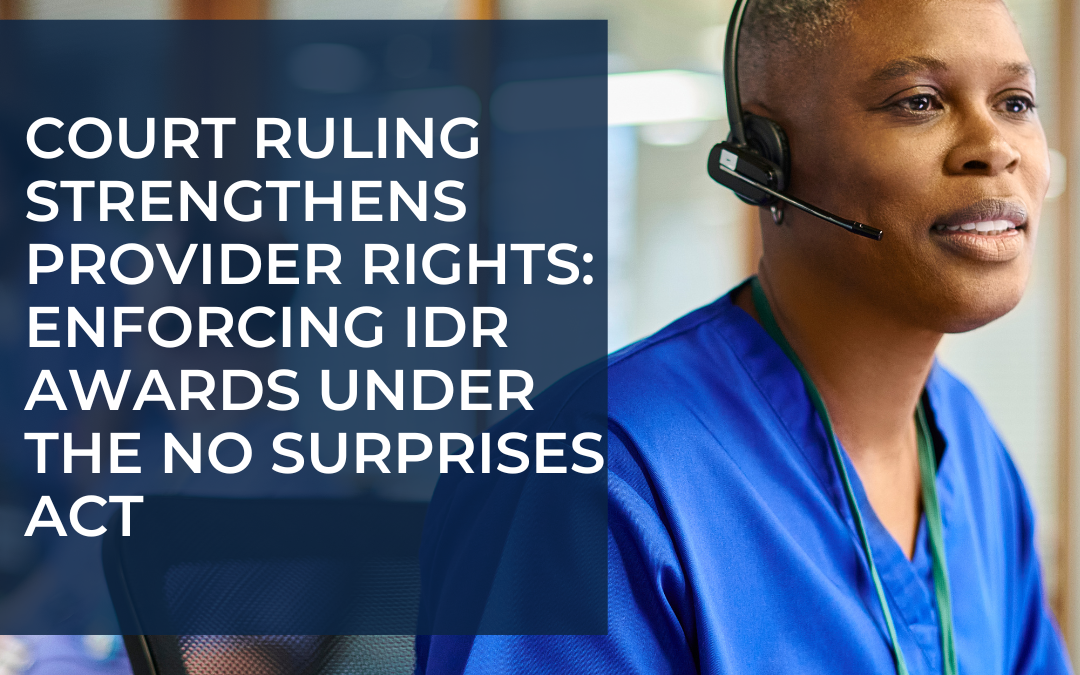A recent federal court decision is making waves in the healthcare reimbursement landscape—especially for emergency medicine providers and freestanding ERs. In a pivotal case, a court has recognized a private right of action for providers to enforce Independent Dispute Resolution IDR awards under the No Surprises Act (NSA).
This ruling is a critical development in the effort to ensure timely and fair payment for out-of-network services and adds a powerful enforcement tool to the provider’s arsenal.
The Case at a Glance
In the case reviewed by the U.S. District Court for the Eastern District of Texas, the plaintiff—a healthcare provider—successfully received a favorable IDR determination under the NSA. However, the payer failed to issue payment in accordance with that determination.
Rather than waiting on federal agencies to enforce compliance, the provider filed a lawsuit. The court sided with the provider, affirming that the No Surprises Act permits a private cause of action for enforcement of IDR decisions. This legal clarity is significant, as it allows providers to take matters into their own hands when payers fail to comply with binding IDR outcomes.
What This Means for Providers
Prior to this ruling, providers faced uncertainty over how to enforce favorable IDR rulings. While the NSA created the IDR framework, it lacked clear guidance on enforcement mechanisms. This court decision clarifies that providers have the legal standing to bring suit against noncompliant insurers directly.
Key Implications Include:
- Stronger Leverage in Payer Negotiations: Providers can now credibly threaten legal action if an IDR award is ignored, helping enforce accountability.
- Faster Payment Resolutions: Legal recourse may deter payers from delaying or denying legitimate payments.
- More Empowered RCM Strategy: For groups like freestanding ERs and emergency medicine providers, this development helps secure financial stability.
Action Steps for Emergency Medicine Groups
QMACS recommends the following to capitalize on this evolving legal landscape:
- Track All IDR Awards – Maintain detailed records of all IDR outcomes, payer communications, and payment statuses.
- Act Promptly on Non-Payment – If a payer fails to honor an IDR ruling, consult with legal counsel to assess your litigation options.
- Stay Educated on Legal Precedents – This ruling may lead to similar cases across other jurisdictions, further strengthening enforcement rights.
- Lean on Experts – Work with RCM partners like QMACS who understand the nuances of IDR submissions, tracking, and follow-up.
QMACS Supports Your Success
The IDR process under the No Surprises Act was intended to bring fairness and balance to reimbursement disputes. This court ruling helps fulfill that promise by providing providers with a concrete path to enforcement.
At QMACS, we monitor legal and regulatory changes that impact revenue cycle operations—and we take action to keep your practice protected. Whether you’re navigating IDR, payer denials, or broader RCM challenges, our team is here to help.
Let’s Talk
Need help with IDR case management or appeals? Contact us today to find out how QMACS can support your emergency medicine group or freestanding ER.


